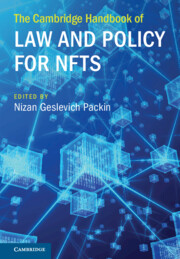Book contents
- The Cambridge Handbook of Law and Policy for NFTs
- The Cambridge Handbook of Law and Policy for NFTs
- Copyright page
- Dedication
- Contents
- Figures
- Tables
- Contributors
- Acknowledgments
- Part I Introduction and Background
- Part II Financial Regulation and Investor Protection
- Part III Capital Markets, Community, and Marketing
- Part IV Intellectual Property and Ownership Rights
- Part V Data Protection, Privacy, Cybersecurity, and NFTs
- Part VI Other Legal Issues with NFTs
- 18 NFTs, the Metaverse, and Emerging Technology Governance
- 19 Resolving NFT and Smart Contract Disputes
- Part VII Conclusions and Future Directions
- Index
18 - NFTs, the Metaverse, and Emerging Technology Governance
from Part VI - Other Legal Issues with NFTs
Published online by Cambridge University Press: 02 November 2024
- The Cambridge Handbook of Law and Policy for NFTs
- The Cambridge Handbook of Law and Policy for NFTs
- Copyright page
- Dedication
- Contents
- Figures
- Tables
- Contributors
- Acknowledgments
- Part I Introduction and Background
- Part II Financial Regulation and Investor Protection
- Part III Capital Markets, Community, and Marketing
- Part IV Intellectual Property and Ownership Rights
- Part V Data Protection, Privacy, Cybersecurity, and NFTs
- Part VI Other Legal Issues with NFTs
- 18 NFTs, the Metaverse, and Emerging Technology Governance
- 19 Resolving NFT and Smart Contract Disputes
- Part VII Conclusions and Future Directions
- Index
Summary
The chapter explores the profound implications of non-fungible tokens (NFTs) within the context of the Web 3.0 movement and the burgeoning metaverse landscape. While NFTs have already found some economic traction in analog settings, their potential is most transformative in a purely digital realm. NFTs offer unparalleled provenance and tradability for digital assets, circumventing centralized intermediaries. The metamorphosis of NFTs and their role in the emergence of the metaverse will determine their full impact. As metaverse platforms evolve, enabled by NFT interoperability and consumer trust, they are poised to reshape the leisure economy and extend into education and employment. The true value of NFTs lies in their integration into an interconnected, dynamic virtual world revolutionizing various facets of society. While existing regulations provide a framework, they will inevitably adapt if and as the metaverse gains prominence, necessitating agile regulatory responses to this transformative landscape.
- Type
- Chapter
- Information
- The Cambridge Handbook of Law and Policy for NFTs , pp. 351 - 371Publisher: Cambridge University PressPrint publication year: 2024

